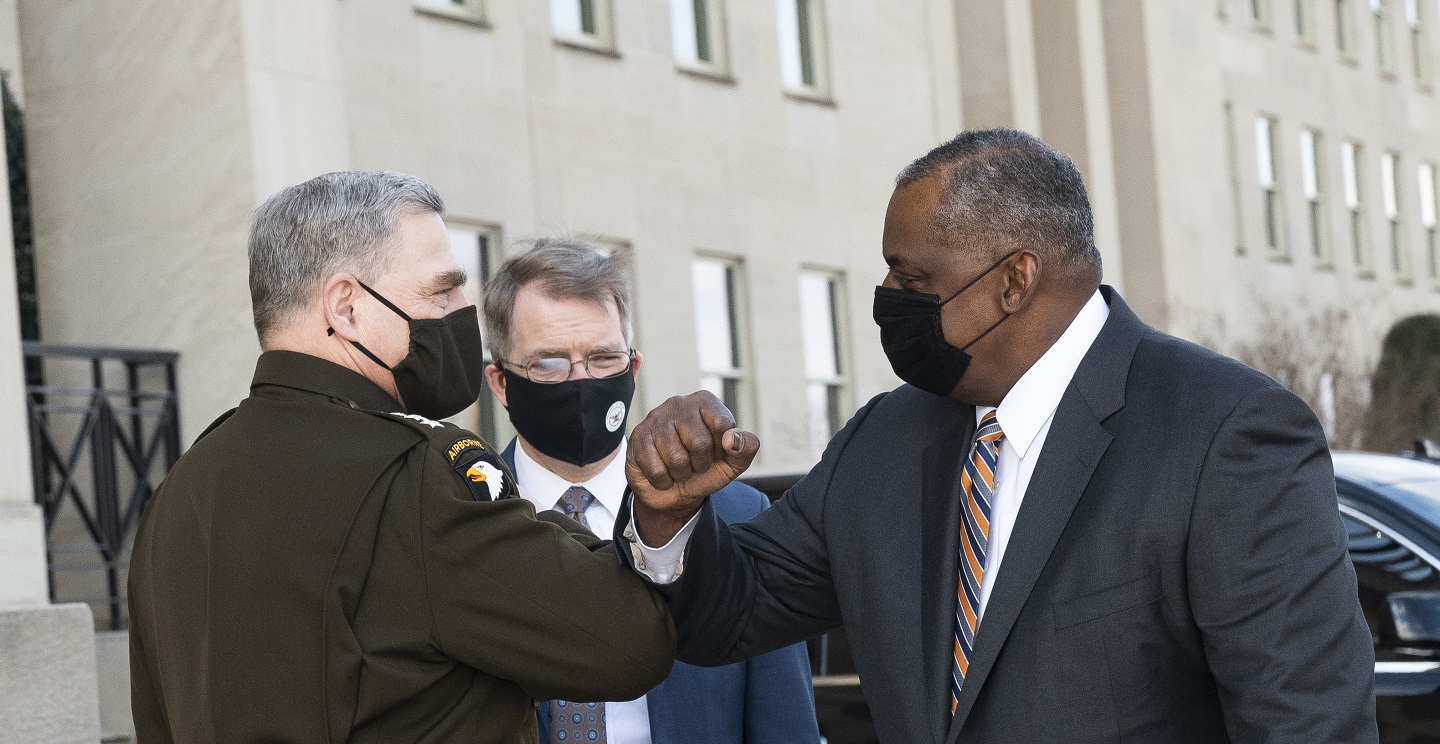
5 Feb 2021/1545 – Editor’s Correction: It was pointed out that Secretary McNamara actually worked for Ford not General Motors as previously stated.
Before the events of 6 January in the nation’s capital, WAR ROOM received several submissions dealing with the topic of the military’s relationship with “politics.” It’s an extraordinarily complex discussion–from understanding, interpreting, and abiding by relevant law and regulation, to the importance of norms, and the very definition of what counts as “political” or “partisan”–none of these questions are simple. Investigations since the 6th have revealed at least one active and a number of former military members who appear to have been involved in varying degrees with the activities seen around the world on news feeds. In an attempt to further a useful discussion of the civil-military relationship WAR ROOM will publish these pieces over the next several weeks each Friday.
The fourth offering in this brief series is this article by Marybeth P. Ulrich and Noah C. Fisher. They examine the erosion of norms that has occurred with the nomination and confirmation of retired Army General Lloyd Austin as the Secretary of Defense. Austin’s confirmation is the third time that a waiver for the “cooling off” period has been granted, but perhaps more importantly the second in four years. Ulrich and Fisher appraise what impact this waiver may have and remind us that “norms that are not enforced cease to be norms, having lost the shared understanding that underpin them.”
The legal requirement for a 7-year “cooling off” period is designed to advance this democratic norm.
President Joseph Biden’s nomination of retired Army General Lloyd Austin as his choice for Secretary of Defense raised questions about the continued relevance of the norm that a civilian, not a recently retired general, should hold the post. Those opposed to the nomination cited the importance of adhering to the principle of civilian control. The legal requirement for a 7-year “cooling off” period is designed to advance this democratic norm. On January 21st the 117th Congress passed a waiver, and the Senate confirmed Austin as the Secretary of Defense, marking only the third time (but the second time in four years) that such a waiver has been requested and granted.
Since Austin’s confirmation, discussion of this norm may recede from public attention, but examining the historical significance of the norm, the different skills that civilians and military officers might bring to the role, and the ways in which democratic norms could be compromised with a military professional in the role deserve serious and continued discussion. Strong civilian control of the military mitigates both the potential for the government to misuse the standing army and the threat of the military exerting its will over the people. Civilian control was also meant to ensure civilian political leaders would be free to pursue their objectives, independent of undue military influence. These guardrails are now at risk as the lines between civilian and military roles in the United States government have become increasingly blurred.
Historical precedents
Unchecked military power has been at the forefront of American concerns since its founding. In the Declaration of Independence, the colonists charged that King George III “has affected to render the Military independent of and superior to the Civil power.” They were so concerned that unchecked military power could threaten the very liberty the new republic was created to protect that they agreed to only a small standing army and included numerous checks on military power in the Constitution. Civilian control was split between the president and Congress to distribute national security powers between the two branches. Civilian control was split between the president and Congress to distribute national security powers between the two branches.
For the first 150 years of the republic the principle of civilian control played out through civilian secretaries with the Secretaries of War and Navy overseeing the Army and Navy, respectively. These figures played major roles in planning and executing military operations, culminating in collaboration with the newly formed Joint Chiefs of Staff during World War II. After the war, when Congress overhauled the defense establishment through the National Security Act of 1947, it created the position of a secretary of defense to preside over the service secretaries and the newly established Department of Defense. The law set explicit requirements, including a cooling-off period of ten years before someone who had served as an active-duty officer could fill the role. (In 2007, Congress changed the cooling off period to seven years, citing a desire to expand the pool of qualified candidates with relevant military experience.) To waive this cooling-off period requires a majority vote in both houses of Congress.
In 1950 President Harry Truman turned to his former Secretary of State, retired five-star General George C. Marshall, to return to the administration as Secretary of Defense. North Korea had invaded South Korea and the United States military was unprepared to wage the Korean War. Truman regarded Marshall as uniquely capable to direct the build-up of forces required to get the country on a solid war footing. Marshall agreed to serve for a six-month term and only if his deputy at State, Robert Lovett, was appointed undersecretary so that he could succeed Marshall when he stepped down. Marshall served one year in the post.
When Marshall was granted a waiver, Congress stated that the Act should not be construed “as approval by the Congress of continuing appointments of military men to the office of Secretary of Defense in the future.” The Senate report associated with the legislation granting the waiver stated, “It is hereby expressed as the sense of the Congress that after General Marshall leaves the office of secretary of defense, no additional appointments of military men to that office shall be approved.” Waivers were supposed to be rare – granted only in extraordinary circumstances.
But the norm of civilian control is not the only reason to value having a “pure” civilian in the role of secretary of defense. Military officers and defense-industry civilians cultivate different competencies and areas of expertise. They have different worldviews and experiences and participate in different professional cultures.
What is at stake?
The role of the secretary of defense is one that the broad perspective of a national leader whose lived experience—ideally some combination of business, military, political, and technical experience–comes primarily from civilian life.
A survey of past Secretaries’ backgrounds reveals this diversity. Robert McNamara’s experience leading Ford after World War II influenced his introduction of business practices to DoD. James Schlesinger had been a defense economist and CIA chief before shifting to head DoD. Harold Brown and William Perry were scientists in the defense industry and in government. Melvin Laird, Donald Rumsfeld, Richard Cheney, William Cohen, Les Aspin, and Leon Panetta had all served in Congress. Robert Gates had decades-long experience in top policy and management positions in the National Security Council and CIA. All brought substantial, though varied, civilian experience, essential for the Secretary of Defense role which operates at the seam of political and military expertise.
As American civil-military relations evolved in the 20th century, the concept of civilian control came to depend more on the norms of the military profession. Career military professionals lack the relevant political experience in part because the prevailing norms of military professionalism stress the importance of the military remaining apolitical.
This norm is primarily derived from Samuel Huntington’s work, The Soldier and the State, which argues that strategic outcomes are optimized when both military and political expertise is contributed to the process. Senior military leaders are trained to provide military advice to the political leadership to inform their decisions. According to Huntington, military leaders should be unconcerned with making political calculations in their recommendations; as a result, they do not bear the same responsibility for these decisions as elected officials. But the Secretary of Defense role is inherently a political one.
Additionally, the military fosters a cultural predisposition that ill-prepares military leaders to assume leadership roles in civilian bureaucracies and may also result in poor understanding, or even disdain, for politics and the bureaucratic process. Senior officers serving at the top of their profession also expect a high degree of institutional autonomy and deference. Military officers expect that civilians should refrain from interfering in the management of the military institution, especially issues related to good order and discipline. A recently retired general, as a product of military culture, may be reluctant to exercise oversight that the military would perceive to be intruding on its professional autonomy.
The national security bench is deep in the United States.
Third, a retired-military Secretary of Defense risks both politicizing military officers and also militarizing civilian roles. The prospect of assuming influential civilian positions following active-duty retirement may incentivize senior officers to align themselves politically with particular politicians or political parties to gain favor and the chance at a future appointment. Some have indeed been rewarded with prestigious ambassadorships or administration posts, which suggests this trend is already occurring to some extent. At the same time, the risk of militarizing civilian positions should not be overlooked. There are qualified and well-prepared civilians who should be considered for the secretary’s position, having either risen though the ranks of the civil-service, or through extensive experience outside of the government. The national security bench is deep in the United States.
The United States advocates civilian leadership in other countries around the world as an important democratic norm. Democratizing countries that appoint civilian experts as ministers of defense are considered to have achieved a major milestone toward the goal of democratic civil-military relations. Brookings’ Caitlin Talmadge highlighted this point in a recent article, “repeatedly drawing on retired general officers to serve as secretary will also generate the impression that civilians are not qualified to be defense leaders, which is not only flat wrong, but also antithetical to democratic values.” The United States ought to take a careful look at its own practices and assumptions.
How have the concerns played out?
Marshall had the opportunity to sharpen his already keen political and strategy skills as a diplomat and as Secretary of State before beginning his brief wartime tenure as Secretary of Defense. His civilian experience at the highest levels of government was much broader than either General Mattis or General Austin upon assuming the role of defense secretary. Marshall was also known for his strict adherence to the apolitical norm of the military profession, refusing to even practice his right to vote. His brief tenure as Secretary of Defense, and American Presidents’ subsequent deference to the norm for the next 66 years, upheld the intent of the Congress that his appointment would be a one-time exception.
Retired Marine General James Mattis’ nomination to be Secretary of Defense in 2016 resurfaced many of the concerns related to the erosion of the democratic norm. Senator Elizabeth Warren’s and Senator Jack Reed’s opposition to the Mattis nomination focused on the importance of civilian perspective and guarding against politicization in the ranks respectively. Eliot Cohen, a civil-military relations scholar at Johns Hopkins, emphasized the indelible mark that military culture plays in shaping career officers’ lives – which have been largely separate from civil society.
In the end, the House (268-151) and Senate (81-17) easily approved the waiver for General Mattis. With the waiver approved, the Senate voted 98-1 to confirm General Mattis as Secretary of Defense. Only Senator Gillibrand opposed the appointment on the grounds that it violated civilian control. Several members of the House and Senate who voted to approve the waiver said they would never entertain doing so again, viewing the Mattis waiver as a once in a generation occurrence.
Mattis served as Secretary of Defense from January 2017 to February 2019. While in the role he was criticized for being too close to the Chairman of the Joint Chiefs, General Joseph Dunford, a fellow Marine, and for lacking the political skills to lobby Congress for more funding. Mattis also severely limited press access to the Pentagon. Representative Mike Gallagher, a Republican Marine Corps veteran, wrote in an op-ed for the Wall Street Journal that “Secretary Mattis seemed to run the Pentagon like it was a combatant command” and was ill-equipped to focus on the long-term defense acquisitions needed to modernize the force. Mattis’ lack of a background in politics also led to criticism that he undervalued the importance of engaging the public on national-security issues.
Retired Army General Lloyd Austin’s nomination brought many concerns to the fore again. The Republican Study Committee, which advises GOP lawmakers on pending legislation, released a memo a week after the 6 January attack on the Capitol which was indicative of these concerns. The memo cited many of the academic arguments against granting a waiver just four years after granting one to General Mattis, arguing this would set a “new dangerous precedent.” Civil-military experts cited the prohibition against recently retired generals as “foundational” to maintaining civilian control and editorial boards sought greater justification for disregarding the norm and an explanation for how the trend of appointing retired military officers will be abated.
In the end the Senate voted 69-27 to grant the waiver. Several senators from both parties cited their commitment to the principle of civilian control as the rationale for their nay vote. Ultimately, concerns related to the 6 January attack on the Capitol, a desire to rapidly get President Biden’s national security team in place, and the historic nature of General Austin’s appointment as the first African American to serve as Secretary of Defense overrode the principled arguments to preserve civil-military norms.
The future of democratic civil-military relations norms.
Civil-military relations norms are a subset of their parent – democratic norms writ-large. Upholding these democratic norms requires citizens who understand them and are committed to enforcing them. However, as the debate over the nomination of Lloyd Austin indicated, the democratic norms associated with civilian control are poorly understood. Such understanding depends on sufficient familiarity with the military profession, its culture, andistinct role in the political process. Having a Secretary of Defense “who shall be appointed from civilian life” ensures that the concerns associated with having the appropriate experience, compromising the military’s professional ethos, and militarizing positions intended for civilians do not come to pass. The fundamental concern of the Founders with regard to the possibility of concentrated military power would also be checked.
The Trump administration frayed many democratic norms, and the Biden administration has pledged to restore them. Insisting on a secretary of defense only four years removed from civilian life deviated from that all-important course correction. Norms that are not enforced cease to be norms, having lost the shared understanding that underpin them. Presidents have the responsibility to balance the risk to established norms and civil-military relations with other considerations driving their Cabinet selections. However, part of the assumption of risk is the adoption of measures to mitigate it. In order to counter the negative impact on civil-military relations that may result in the Austin appointment, the Biden administration should be vigilant against the further blurring of civil and military roles and support efforts to educate the military and society alike in the norms of democratic civil-military relations.
Marybeth P. Ulrich is a Distinguished Visiting Professor of Political Science, U.S. Air Force Academy and Professor of Government, U.S. Army War College. Noah C. Fisher is an Instructor of Political Science, U.S. Air Force Academy. The views expressed in this article are those of the authors and do not necessarily reflect those of the U.S. Air Force Academy, U.S. Army War College, the U.S. Air Force, the U.S. Army, or the Department of Defense.
Photo Description: Secretary of Defense Lloyd J. Austin III greets Deputy Secretary of Defense David L. Norquist and Chairman of the Joint Chiefs of Staff Army Gen. Mark A. Milley upon arrival at the Pentagon, Jan. 22, 2021.
Photo Credit: Lisa Ferdinando, DOD
Other Articles in our Civ-Mil MiniSeries:
SHOULD THE MILITARY LEADERSHIP SPEAK UP ON PARTISAN POLITICS?





The issue of “civilian control” may not be what is “in play” here, rather, the appointment of GEN Austin as SecDef may have more to do with (a) the image that we want to present both at home and abroad; this, (b) as relates to our (at the current moment at least) “inclusion,” “progress” and “change” view of what is required to achieve and maintain national security.
Explanation:
In this regard, let us view the issue of GEN Austin’s appointment as Secretary of Defense from the perspective of today’s two — diametrically opposed it would seem — “organizing” and “ordering” ideas; ideas which are competing for the world’s attention, approval and allegiance today. These such ideas being:
a. The requirement to continue to “modernize” one’s own state and society (and indeed others); this, so as to compete and win in the modern world. This requires that one — via such things as one’s domestic and foreign policies — be prepared to (a) alter traditional ways of life, traditional ways of governance, traditional practices, traditional values, etc.; this, so as to (b) better provide for, and better benefit from, such things as globalization and the global economy. (In this such “continuing modernization and inclusion”/”embrace change” manner, “national security” to be both achieved and maintained.) And:
b. The requirement to halt — both at home and abroad — these such “modernization and change” practices and processes. And, indeed, in many cases, to aggressively roll these such practices and processes back. From this such perspective, it is not the lack of modernization and/or change that threatens national and international security but, rather, the disruptions and chaos — both at home and abroad — that the pursuit and realization of such modernization and change bring in their wake.
Bottom Line Thought — Based on the Above:
The appointment of GEN Austin as SecDef (and, indeed, his immediate move to require sexual assault reports from the field?); this, MORE THAN ANYTHING ELSE, may be designed to SEND A MESSAGE to both the American people and to the rest of the world.
This such message being that:
a. At least for the present, we are once again committed to the “inclusion,” “modernization” and “change” theory of “national security.” And that, accordingly:
b. At least for the moment, we once again reject the idea that such things as “national security” can be achieved by halting and/or reversing “progress.”
(Here, for example, is an item — relating to the actions of the U.S. Supreme Court in this case — which shows our, prior to 2017, [a] commitment to such things as “inclusion,” “modernization” and “change” and [b] how such things as “national security” were/are seen exactly in that context:
“Even more telling than its use of elite opinion in ‘Lawrence’ was the Court’s unembarrassed reliance on elite views to determine the scope of a highly contested constitutional anti-discrimination norm in ‘Grutter.” Relying extensively on amicus briefs submitted by elite corporate, military, and educational authorities, Justice O’Conner, writing for the majority, asserted the following:
“Major American businesses have made clear that the skills needed in today’s increasingly global marketplace can only be developed through exposure to widely diverse people, cultures, ideas, and viewpoints. What is more, high-ranking retired officers and civilian leaders of the United States military assert that ‘[based on their] decades of experience,’ a ‘highly qualified, racially diverse officer corps … is essential to the military’s ability to fulfill its principle mission to provide national security.’ …”
“In short, the Court based its constitutional reasoning on the contention of a group of the Nation’s key corporate, political, and military leaders that the Nation’s prospects of success in the face of international strategic threats, as well as continued stability and perceived legitimacy in its domestic political institutions, required racial preferences in elite formation through our major educational institutions.”
[See the 2005 Catholic University of America, Columbus School of Law paper entitled: “Moral Communities or a Market State: The Supreme Court’s Vision of the Police Power in the Age of Globalization,” by Antonio F. Perez and Robert J. Delahunty, Pages 698 and 699])